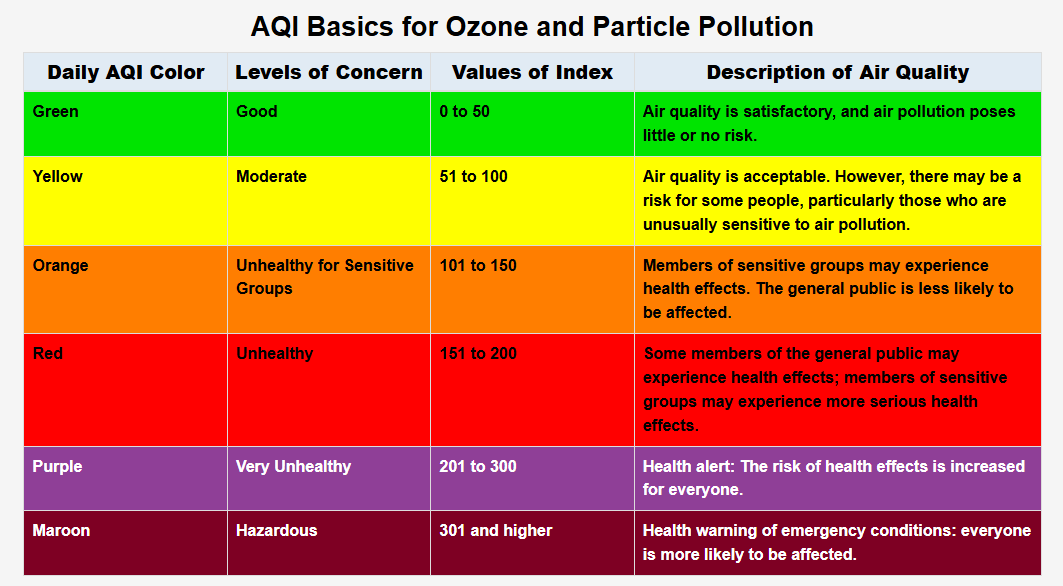The web Browser you are currently using is unsupported, and some features of this site may not work as intended. Please update to a modern browser such as Chrome, Firefox or Edge to experience all features Michigan.gov has to offer.
Michigan air quality impacted by smoke and fires this week
June 08, 2023
Meteorologists at the Michigan Department of Environment, Great Lakes, and Energy (EGLE) have issued air quality alerts for high levels of fine particulate in the air. These levels are caused by smoke from fires in Michigan and Canada. These conditions are expected to continue throughout the rest of the week. Meteorologists are continuing to assess conditions and will issue additional alerts if necessary.
How to sign up for alerts:
You can sign up for alerts through the EnviroFlash system. This subscriber system allows you to choose the area you would like to get alerts for. The system will send the alert directly to your email or send you a text message.
The Air Quality Index:
The Air Quality Index, or AQI is a color-coded way for residents to see what the levels of some types of air pollution are in their area. The higher the AQI, the worse the air quality is and the more cause for concern.
Currently the AQI for particulate matter (PM) is high in many parts of Michigan and the eastern US due to smoke and fires in the US and particularly in parts of Canada. The AQI is also used for levels of other pollutants, like ozone.
Air Quality Index (AQI)
Protecting your heath during smoke events:
The US Environmental Protection Agency (US EPA) has stated, “Most healthy adults and children will recover quickly from smoke exposure and will not have long-lasting health effects. But people with chronic diseases, such as asthma, other lung disease, or cardiovascular disease are at greater risk of experiencing more severe health effects. Children, pregnant people, and people over 65 also are more vulnerable to health effects from smoke exposure. Limit your outdoor exercise when it is smoky or choose lower-intensity activities to reduce your smoke exposure. When indoors, take steps to keep your indoor air cool and clean. For more tips, see When smoke is in the air.”
The Michigan Department of Health and Human Services (MDHHS) has advised the following:
For people with heart or lung disease, older adults, children, and teens it is suggested to take the following steps to reduce exposure:
- Avoid strenuous outdoor activities.
- Keep outdoor activities short.
- Consider moving physical activities indoors or rescheduling them.
For everyone else:
- Choose less strenuous activities (like walking instead of running) so you don’t breathe as hard.
- Shorten the amount of time you are active outdoors.
- Be active outdoors when air quality is better.
Follow MDHHS on social media for the most recent health and safety information:
- Michigan Department of Health and Human Services | Facebook
- Michigan HHS Dept (@MichiganHHS) / Twitter
Information on climate and wildfires:
Extreme heat caused by climate change can cause longer and more severe dry periods due to increased evaporation and lack of rainfall, causing vegetation to ignite easier and fires to spread faster. Windy conditions, like we’re seeing now, can not only help the fires to spread easier, but can also harm fire control efforts and cause severe air quality concerns not just locally, but even hundreds of miles away as the corresponding smoke is carried with the winds. As greenhouse gases continue to warm the planet, events like these will become all the more frequent and severe, highlighting the importance and necessity of near- and long-term climate action, and underscoring the need to rapidly implement the MI Healthy Climate Plan.
Additional helpful resources:
These resources may be helpful to you if you are looking to learn more about air quality in your area, specifically around wildfires and smoke impacts.
- US EPA Wildfires and Smoke map
- US EPA Interactive Map of Air Quality
- US EPA Fires and your health
- US EPA Particle Pollution
- EGLE Air Monitoring Information and interactive map
- Is burning allowed? and Michigan.gov/OpenBurning
Who to contact:
If you have questions related to this, contact EGLE Spokesperson, Jill Greenberg at GreenbergJ@Michigan.gov or 517-897-4965.
Media Contact:
